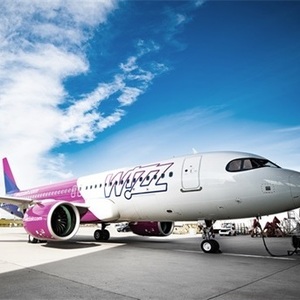Neste to supply sustainable aviation fuel to Wizz Air

February 22, 2023
BY Neste Corp.
Neste and Wizz Air have agreed on the supply of Neste MY Sustainable Aviation Fuel from 2025 onwards. The agreement gives Wizz Air the opportunity to purchase 36,000 tons of Neste-produced sustainable aviation fuel (SAF) per annum over a period of three years for the airline to use across its route network in Europe and the UK.
The SAF volumes to be purchased are a key part of the airline’s environmental strategy to reduce carbon emissions intensity per passenger kilometer by 25 percent by 2030 and reach net-zero by 2050. In 2022, Wizz Air achieved its lowest ever annual carbon intensity, which amounted to 55.2 grams per passenger/km. The airline has been continuously adding new Airbus A321neo aircraft to its fleet and replacing older aircraft. These aircraft can currently fly with up to 50 percent SAF blend.
Advertisement
“At Wizz Air, we continue to invest in innovative technology and believe that SAF is a key part of the solution for decarbonizing the aviation industry. The partnership with Neste, the world's leading producer of SAF, reaffirms our progress in reducing our carbon emissions intensity, which is already one of the lowest in the world. Working together with Neste, we will drive the adoption of SAF throughout our network, paving the way to a more sustainable future for aviation,” said Ian Malin, executive vice president and group chief financial officer at Wizz Air.
“Neste is committed to helping the aviation industry move towards a more sustainable future. This agreement with Wizz Air, one of the industry’s sustainability leaders, shows how we are enabling airlines to use SAF across their route networks. We look forward to working together with Wizz Air on the reduction of their carbon emissions, as we increase our annual SAF production capacity to 1.5 million tons by the end of 2023,” said Jonathan Wood, Vice President Europe, Renewable Aviation at Neste.
Sustainable aviation fuel
SAF is a next generation aviation fuel providing a more sustainable alternative to conventional, fossil based jet fuel. It is widely recognized as a key solution for achieving the aviation sector’s emission reduction goals. Using Neste MY Sustainable Aviation Fuel reduces greenhouse gas emissions by up to 80 percent* over the fuel’s life cycle compared to using fossil jet fuel. Neste MY SAF is produced from sustainably sourced, 100 percent renewable waste and residue raw materials, including used cooking oil and animal fat waste. SAF is blended with conventional jet fuel and works seamlessly with existing fueling infrastructure and aircraft engines.
Advertisement
*) When used in neat form (i.e. unblended) and calculated with established life cycle assessment (LCA) methodologies, such as CORSIA methodology
Related Stories
NREL announced the findings of the Assessment of BQ-9000 Biodiesel Properties for 2024, the eighth in a series of annual reports documenting the quality of biodiesel from U.S. and Canadian producers participating in the BQ-9000 program.
Kintetsu World Express Inc. has entered into a new agreement with Shell Aviation regarding the use of SAF. Under this agreement, KWE will adopt Shell Aviation's digital platform "Avelia" to swiftly address shippers' low-carbon transportation needs.
Aemetis Inc. released Q2 results, reporting increase revenue when compared to Q1. During an earnings call, company officials detailed progress with the company’s RNG, ethanol, biodiesel, SAF and carbon CCS projects.
Calumet Inc. on Aug. 8 confirmed its Montana Renewables biorefinery is currently running at full capacity. An initial phase of the company’s MaxSAF initiative remains on track to boost SAF capacity to up to 150 MMgy by mid-2026.
Marathon Petroleum Corp. on Aug. 5 released second quarter financial results, reporting improved EBITDA for its renewable diesel segment. The company primarily attributed the improvement to increased utilization and higher margins.
Upcoming Events










